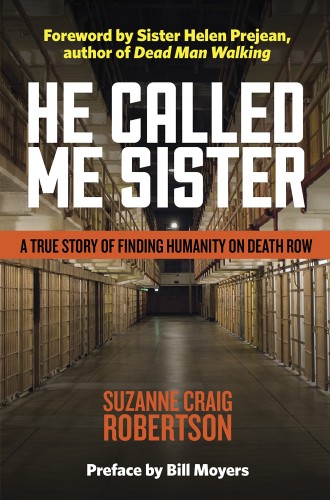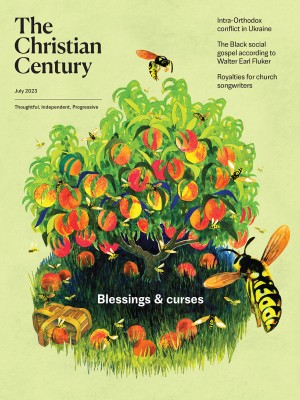A very particular humanity
Suzanne Robertson didn’t meet “life” on death row. She met a man named Cecil who loved cheesecake.
I admit that I rolled my eyes when I saw the subtitle of Suzanne Craig Robertson’s memoir about her family’s friendship with an incarcerated Tennessee man, Cecil C. Johnson Jr., in the decades before his execution in 2009. “A true story of finding humanity on death row” seemed to imply that Robertson went to death row unaware that there was any humanity there. How predictable, I grumbled to myself, that a White Baptist who works for the Tennessee Bar Association would have to learn through experience that someone living on death row is actually human.
In some sense, Robertson plays up the narrative of a naive and sheltered southerner being pulled into an unexpected relationship that sparks a conversion to a more expansive, more gracious worldview. This makes the book ideal for discussion by groups whose members embody various backgrounds, cultural contexts, and political convictions. There is enough doubt about Johnson’s guilt that even readers in favor of capital punishment will be sympathetic to Robertson’s belief that Johnson’s execution was unjust.
Read our latest issue or browse back issues.
But something else is happening in He Called Me Sister, although I didn’t see it until I got to the part where Robertson quotes Johnson’s own writing. In his memoir (a 50-page, single-spaced text written on a typewriter with a fading ribbon, annotated with a blue pen, and mailed to Robertson in a manila envelope), Johnson recalls a childhood memory:
I remember one holiday so clearly. We didn’t have much at all, no coats or hats, gloves and only one pair of shoes and they was so bad that we put cardboard paper in them to cover the holes. On that Christmas morning, David and I got up and put on three to four shirts, a few pair of pants and socks on our hands for gloves, for it had been snowing for days and it was extremely cold and messy outside. As we walked over to our grandmother house, I remember looking at all the pretty decorations we passed. I could hear music and laughter all around. New bicycles on some of the porches. I will never forget the sadness I felt that day.
I read these words and realized that the humanity missing from Robertson’s early view of Johnson isn’t abstract; it’s particular. It isn’t rooted in a political belief about incarceration or the death penalty. It’s simply the tangibility of an individual life: the cardboard paper lining a boy’s worn shoes, the sound of laughter that crushes the spirit of a neglected child on Christmas morning, the slush of feet in melting snow as two brothers trudge toward their grandmother’s house. Robertson found humanity on death row because she went there and formed a relationship with a specific man who lived there.
Reading Johnson’s description of that Christmas memory, I realized that I had dehumanized him by envisioning him as an abstract victim of our country’s legal system rather than as a living, breathing man with emotions and memories. What’s more, I had done so in the service of caricaturing Robertson as a different kind of Christian than me, one who needed to be enlightened. Like Martin Luther’s theological use of the law, Johnson’s words showed me where I’d fallen short.
I tell this story because it shows how He Called Me Sister is more than a heartwarming portrait of an unlikely friendship, a model of successful lay ministry, and an illustration of problems with the death penalty that will speak to Christians across the political spectrum. It’s also a testimony, in the sense that it accomplishes what it portrays: a change of heart. Robertson repeatedly asserts that Johnson was more of a minister to her family than they were to him during all their years of friendship. By including his words in her book, she extends Johnson’s ministry beyond his execution, sharing it with her readers.
Robertson states throughout the book that her family’s love for Johnson isn’t contingent on his innocence. This love is apparent as she describes encounters with Johnson: the sparkle in his eyes when he holds her newborn baby in the prison’s visiting room, his teasing over the phone about the way she cooks, an overheard conversation with his brother about their abusive childhood. “By the time we might have wondered about details of proving his innocence, we already loved him, this child of God, with whatever baggage he came with.”
Still, in straightforward and sometimes wry prose, she details the troubling circumstances surrounding his conviction. There was no evidence that he committed the murders for which he was executed, and he consistently maintained his innocence. His conviction was based solely on eyewitness accounts, and major inconsistencies in each of those accounts were hidden from the defense team until 12 years after the trial. Johnson’s alibi witness unexpectedly flipped the night before the trial—and then received immunity. One of the jurors later admitted that she wasn’t sure Johnson was guilty, but she was too embarrassed to argue against him receiving the death penalty. These realities were not enough to convince the judicial system to overturn Johnson’s sentence, but they’re likely to convince readers that it should have been overturned.
Robertson does a good job showing how the death penalty is assigned arbitrarily, often to people whose guilt is questionable, and in a way that falls disproportionately on Black men such as Johnson. In a theological conversation recounted in the book’s final chapter, Robertson’s daughter reminds her that it shouldn’t matter that Johnson was likely innocent. But again, the fact that he was makes He Called Me Sister approachable for a wider range of readers.
The greatest gift of this book is in its revelation of multiple layers of truth. A man was killed by lethal injection at 1:34 a.m. on December 2, 2009. A man who was likely innocent was killed by lethal injection at 1:34 a.m. on December 2, 2009. A man named Cecil (who was likely innocent and was killed by lethal injection at 1:34 a.m. on December 2, 2009) loved Sara Lee frozen cherry cheesecakes, found comfort in the book of Job, and wrote these words: “I thought it was my willpower that helped me survive. I know differently now. Those were the times when the Lord carried me and was with me, just as he is with me now. This is what I hope you will see.”








